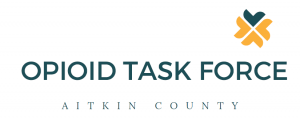 Since receiving a grant for addressing the opioid crisis earlier this year, Riverwood Healthcare Center has been partnering with local organizations to raise awareness around what the community can do to address opioid addiction and abuse issues.
Since receiving a grant for addressing the opioid crisis earlier this year, Riverwood Healthcare Center has been partnering with local organizations to raise awareness around what the community can do to address opioid addiction and abuse issues.
The Aitkin County Opioid Task Force, formed in June 2018, includes Riverwood, Northland Counseling, local school districts–Aitkin, Hill City and McGregor—Aitkin County Health & Human Services, the Aitkin County Sheriff’s Office, Aitkin City Police and local pharmacies. Representatives of these organizations have been meeting monthly to share information and take steps to address local opioid abuse and addiction issues.
The goals of the task force are to implement strategies to reduce opioid abuse through care coordination, social service needs, prescriber education, proper opioid disposal, and increase access to treatment for people experiencing opioid use disorder.
The task force is following the successful model set by CHI St. Gabriel’s Health in Little Falls, Minn., to mirror their successful and nationally recognized opioid reduction strategy. In 2015, CHI St. Gabriel’s developed a model focused on reducing inappropriate use of opioids through care coordination, addressing unmet social service needs, prescriber education and assistance, proper opioid disposal, and engaging partners outside the health care system.
Using the St. Gabriel’s approach, Riverwood is also working to review patient cases and create plans to help patients taper off opioid medications, while preventing new opioid dependencies.
On Oct. 11, the Task Force sponsored an educational program for Aitkin and McGregor high school students, bringing a young woman, Monica, and her physician, Dr. Heather Bell of CHI St. Gabriel’s, to tell her story of drug addiction, suboxone treatment and recovery.
Suboxone treatment program is underway
Riverwood now offers treatment with suboxone to those who are addicted to opioid medications or other narcotic drugs. Currently, there is just one Riverwood physician, Dr. Melissa Herbranson, who is certified to prescribe and oversee suboxone treatment at Riverwood’s Aitkin clinic.
Renee Senich, a registered nurse at Riverwood, is the first point of contact for anyone who wants to pursue treatment for substance abuse related to opiates or narcotics. She does the initial intake interview with the patient and assessments that she passes on for review by a physician. Treatment is completely confidential, in accordance with the Health Insurance Portability and Accountability Act of 1996 Privacy Rule providing national standards to protect individuals’ medical records and other personal health information.
“Suboxone is a combination of buprenorphine, which helps eliminate narcotic cravings, and naxolone, which acts to prevent the person from getting high,” Senich explained. “The goal is to taper the dose over time and get the person off the suboxone medication. Once treatment starts, the patient returns for follow-up visits at Riverwood.”
Another form of medically assisted treatment is Vivitrol, a once-a-month injection that works by attaching and blocking opioid receptors, which prevents the release of dopamine. When dopamine is blocked, there is no pleasure associated with the use of these drugs. Follow-up care for these patients at Riverwood is with Janet Larson, a psychiatric mental health nurse practitioner who sees patients with behavioral health issues at our Aitkin and McGregor clinics.
Some patients who are candidates for treatment with suboxone may need inpatient care.
“It’s difficult to find inpatient treatment for opioid addiction outside the Twin Cities area, but there are a few programs in greater Minnesota,” Senich said. “We want to help those with opioid addictions get their life back. Sometimes that is returning to work, regaining custody of children or mending fences with family members.”
Anyone who wants information on the suboxone treatment at Riverwood may contact Renee Senich at (218) 927-2121. For help getting into a substance abuse treatment program, call Aitkin County Health & Human Services at (218) 927-7200.
In 2018, the Ne Ia Shing Clinic on the Mille Lacs Band of Ojibwe Reservation also received a Minnesota Department of Health grant for an opioid abuse prevention program in Mille Lacs County. For substance abuse or suboxone treatment information, call Briana Rosvold, registered nurse coordinator, at 320-362-0892.
Storage, disposal of opioid medications
Reducing opportunities for illegal access to opioids is another important initiative of the Task Force. On Oct. 27, the Aitkin City Police provided a Drug Take Back event at Riverwood Healthcare Center to collect unused, unneeded medications.
Dispose of any unused medications at the Aitkin County Sheriff’s Office drop box at the Aitkin County Courthouse, 217 2nd St. NW, Aitkin. For additional disposal locations around Minnesota, go to https://doseofreality.mn.gov/drug-takeback
Another tip for consumers is to store medications that are being used in a locked area to prevent families/friends from obtaining medications that could be abused and used illegally.








